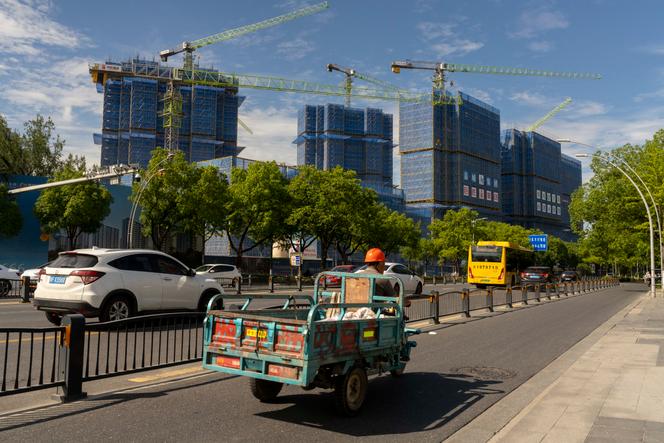


Jiaxing has several shopping malls, but, as in many mid-sized Chinese cities, Wanda Plaza is undoubtedly the most modern. One proof is the fiddle-leaved fig trees in its stores, whose ample leaves have become the essential accessory of trendy boutiques.
Since it opened nine years ago, the center has been a hub for shoppers in this city of 1.5 million residents. Jiaxing has developed rapidly, following Shanghai and the provincial capital Hangzhou, two cities from which it is equidistant. Here, customers can find classics like Uniqlo and Muji, as well as the American backpack brand Sprayground, which opened a store there in 2023. They go to the movies, eat a burger with the family, or a Chinese fondue with friends.
On this summer afternoon, the shopping mall is not empty, but salespeople are struggling to convince people to purchase anything. "People are more careful. Before, if they found things they liked, they would buy several items. That's no longer the case," said Kong Weiting, sorting invoices behind her cash register in a men's casual pants and shirts store.
Kong, 35, dressed in a gray jacket over a black t-shirt with pearl earrings and sporting dizzyingly long false fingernails, knows the phenomenon all too well: she's experienced it personally. Her husband works in apartment renovation; with the real estate market at half-mast, his income has plummeted. As a result, the couple, who have a 10-year-old daughter, are looking at their spending a lot more carefully. Before, Kong allowed herself outings with her husband or friends two or three times a month, where she would spend 200 or 300 yuan (€25-40). Nowadays, the couple thinks it's better to dine at home.
In China, the term "xiaofei jiangji" has come to be used in recent years to describe the situation of increased caution around spending: "downgraded consumption," which could also be translated as "tightening the belt." Consumers in this situation forego pleasure purchases, prefer long public transportation commutes to avoid taking a cab, and feel that they are living below the standard they had previously known or aspired to.
Faced with this caution, brands with ambitions in this monumental market are wondering: When will buyers be optimistic again? Will their fervor ever return? After the Covid-19 pandemic years, Chinese consumption has been slow to recover. It now looks as if it could be settling in for a long period of sluggishness.
China's economy has certainly surged in recent decades, as evidenced by the shopping malls in Shanghai and Shenzhen – but also in more modest cities like Jiaxing, with its modern tramway lines and its residences named to reflect the aspirations of the emerging class, such as "Chianti aristocratic family." Between 1996 and 2022, per capita consumer spending grew by an average of 8% per year.
You have 35.63% of this article left to read. The rest is for subscribers only.
